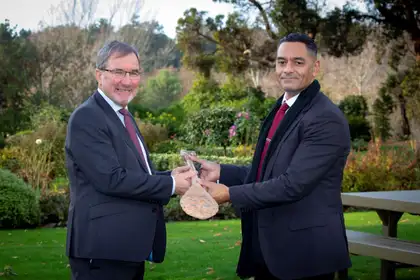
Distinguished Professor Paul Spoonley (left) receiving college gift from head of school of Te Putahi-a-Toi Professor Meihana Durie.
Distinguished Professor Paul Spoonley is as close to a household name in New Zealand as a sociologist can get, thanks to his profile as a prolific commentator on an array of often provocative topics.
His knowledge of immigration, racism and race relations, white supremacists and hate speech as well as employment, education, regional development and Auckland diversity has frequently been sought by news media around the world over the past 40 years.
Next week, after six years as Pro Vice-Chancellor of one of Massey University’s largest colleges, Humanities and Social Sciences, he is stepping aside to re-focus on writing and research in areas of social change he is passionately interested in. These include the aftermath of the March 15 mosque massacres in Christchurch and implications for New Zealand’s Muslim community. For the next few months he will be based at the Max Planck Institute of Religious and Ethnic Diversity in Goettingen, Germany.
Professor Spoonley told colleagues at farewell gatherings at the three campuses over the past fortnight he is “tribally” part of Massey University and “incredibly proud of this place”. Connecting with students in marginalised communities and encouraging them to study, achieve and find their place and voice in society is a major driver of his academic vision, he says.
He joined Massey in 1979 – the same time as former vice-chancellor and fellow sociologist Steve Maharey, who spoke at the Manawatū farewell.
A fellow of the Royal Society of New Zealand, he has led numerous externally-funded research programmes, including the Ministry of Science and Innovation’s $3.2 million Integration of Immigrants and the $800,000 Nga Tangata Oho Mairangi. He has written or edited 25 books including a biography of the late Māori academic and activist Professor Ranginui Walker. In 2010, he was a Fulbright senior scholar at the University of California Berkeley and, in 2013, a senior visiting fellow at the Max Planck Institute.
He was awarded the Royal Society of New Zealand Science and Technology medal in 2009 in recognition of his academic scholarship, leadership and public contribution to cultural understanding. In 2011, his contribution to sociology was acknowledged with the Sociological Association of Aotearoa New Zealand’s scholarship for exceptional service to New Zealand sociology. In 2013, he was given the title of Distinguished Professor, Massey University’s highest academic title.
Historian Professor Michael Belgrave will be acting Pro Vice-Chancellor.